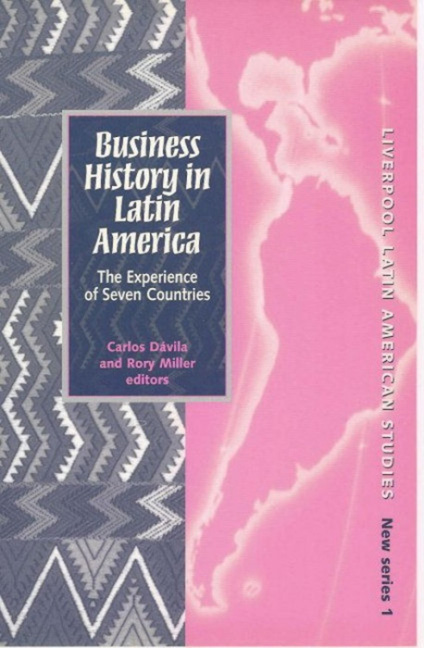Book contents
- Frontmatter
- Contents
- Preface
- Notes on Contributors
- Glossary
- 1 Business History in Latin America: an introduction
- 2 Business History in Argentina
- 3 Business History in Brazil from the mid-nineteenth century to 1945
- 4 Business History in Chile 1850–1945
- 5 Business History in Colombia
- 6 Regional Studies and Business History in Mexico since 1975
- 7 Business History in Peru
- 8 Economic and Business History in Venezuela
- 9 Bibliography
- Index
4 - Business History in Chile 1850–1945
- Frontmatter
- Contents
- Preface
- Notes on Contributors
- Glossary
- 1 Business History in Latin America: an introduction
- 2 Business History in Argentina
- 3 Business History in Brazil from the mid-nineteenth century to 1945
- 4 Business History in Chile 1850–1945
- 5 Business History in Colombia
- 6 Regional Studies and Business History in Mexico since 1975
- 7 Business History in Peru
- 8 Economic and Business History in Venezuela
- 9 Bibliography
- Index
Summary
Business history is one of many areas in which Chilean historiography provides evidence of its limited development. In general terms, this situation is explained by two factors. First, this is a relatively new field of research within the discipline. It has evolved in conditions of great difficulty, and is therefore weak in institutional terms. The second factor goes beyond the sphere of historiography, and has more to do with the dominant trends in the economic and social development of the country. From 1927 until 1974 the state was the principal actor in the economic arena. It is only in the last twenty years that the business elite has begun to occupy a central role in Chilean life. Only then did businessmen, as a group, discover the need to become an object of historical study in themselves, and some historians found them to be an attractive topic, even though not an essential one.
A review of the economic historiography of Chile confirms the fact that the history of business has been a marginal component in the development of the subject. However, such an analysis also enables us to gain a better understanding of the vicissitudes and determinants of the historical research which has taken place on the business elite.
The economic historiography of Chile and the history of the business elite
Despite a relative decline in the study of economic history during the last decade, due fundamentally to the immense boom which has occurred in the study of social history, the subject has experienced a significant, if limited, advance since the early 1960s. As a consequence, our knowledge of the process of economic development in Chile is not only much broader, but it has also become firmly established on more solid foundations.
This academic development was made possible by a number of different phenomena. The economic evolution that Chile experienced between 1940 and the mid-1970s stimulated, from the very beginning, a series of questions which were quickly picked up by specialists, not only from the field of history, but from other disciplines too, most notably economics. The complex and controversial process of economic development in Chile during this period provoked authors from varying intellectual backgrounds into attempts to trace its historical roots in order to explain the initial success, stagnation, and final collapse of the growth strategy based on import substitution industrialisation (ISI).
- Type
- Chapter
- Information
- Business History in Latin AmericaThe Experience of Seven Countries, pp. 60 - 82Publisher: Liverpool University PressPrint publication year: 1999

